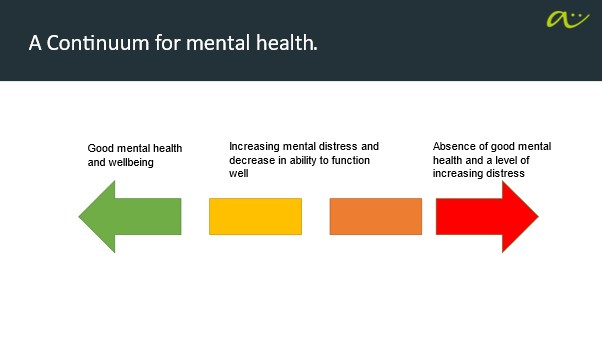
Before you read on, I have a question for you.
What is mental health?
Does it relate to our cognitive function? Is it our emotional regulation? Is it the way our brain transmits and receives signals from the body moment to moment? Is it the way we can adapt and adjust to everyday moments in our lives?
I am one of many who are wondering if we are looking in the right places to shift focus from the narrative of declining mental health to one of realistic optimism.
Take a moment to reflect on a couple of your clients who show up with different levels of engagement, energy, self-belief, and confidence.
Where might they be on the continuum?
How would you know?
What might be appropriate resources for them to shift where they are towards the green end of the continuum?
It really pays to have some knowledge of the signs and symptoms that may show up to indicate coaching might not be the model that will make a difference. For example, your client is not making any progress towards their goals, there is evidence of distress that is impacting everyday life, you find your client keeps coming back to the same thinking distortion repeatedly.
If, on the other hand, coaching can support forward momentum, the client has capacity to do the work and keep their commitments in support of their goals and outcomes, you are working in a partnership then it is reasonable to imagine it has its place.
Where you start to feel a discomfort in the work, you worry about saying or doing the wrong thing, you question coaching’s validity, or your competence, for this client, trust that data. Supervision can help you to explore what might be going on from different perspectives and you may or may not resume the coaching relationship.
ALWAYS though, ALWAYS, remember the person in the coaching session is a human being.
They may be distressed. They may be unwell. We know that connection, listening in a non-judgemental way and responding with compassion can be the start of recovery for some.
I have learned how helpful contracting can be when I am working with any client and especially where I feel our work together might go towards the edges of coaching towards therapy or counselling. It has taken me a while to figure out what I invite us to explore in our early sessions and what I do may not be what you do.
In summary,
With such a focus on mental health across a wide range of clients, industries, professionals and countries, we can be ambassadors and role models for building and sustaining ways of living and working that support deep health, especially our mental health and fitness.
To do that we want to equip ourselves with enough knowledge, skill and understanding to be able to spot signs and symptoms along the continuum. This enables us to have a conversation with our clients about where they are and how we may or may not be the most useful resource for them.
We human beings we can have a magical impact, a ripple effect as we navigate our own flow along the continuum. We matter in the work as does caring for ourselves so we can be well.
This blog was written by Anne Archer, PCC, MSc Psychology of Wellbeing, Coach, Supervisor and passionate advocate for smashing the stigma of mental health
Read more blogs from Anne: Overwhelmed and Overloaded? Coaches – our time is now.

+ 2 more
Achieve confident impactful conversations about Mental Health and Suicide increasing clients resourcefulness